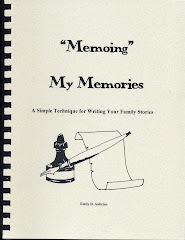Many people neglect recording their own history and that of their immediate family. This is especially true of genealogists who are more busy collecting information on their ancestors than realizing that some day they will be the ancestor their descendants wish had left a journal of their life.
Many people do not have the time to start or know where to begin. In my presentations I show how to continue with your busy life and still find some time to record your childhood memories and family stories.
Often the question is asked by those living now: Why is it important to write my memories and family stories? They lament: My family knows me; knows my life's story. No one will really care about my life; it's really uneventful.
Most of us enjoy knowing a bit about the lives of our grandparents or parents and we often tell our children what we or family members did when very small. All of us possess a desire to know about our heritage. Those descendants in the next fifty years will also wish to know about their heritage and their ancestor's every day life.
We know that history is written by the victor, but it is the history…the story…of the common person that is most important. There are many untold stories that need preserving. It is important that these memories continue to live.
We also know that history which is not written soon after it happens is often forgotten or inaccurately remembered. Like the old telephone game, passing information orally looses its accuracy and detail...or becomes greatly embellished! Over the generations oral history can take on an aura of folklore.
Just as we are interested in how our grandparents made a living or paid $.17 for a gallon of gas, everyday life of the common people will be of interest to the future generations. Think about all the inventions and events that have happened during your lifetime. Our lives have moved rapidly in many ways. Yes, one can read about them in various archives or on the Net, but these are not YOUR stories. Those personal stories, full of your emotion, bring YOU to life in the eyes of your great-great grandchildren long after you are gone.
So why write our family stories? The following are only a few reasons.
1. For its personal healing. Writing is therapeutic. You may write learn about ourselves; to heal wounds; to realize how your life experiences have shaped you.
2. To create a bond with the family, as stories are shared and remembered.
3. To understand the skeletons in the family closet and to help family members accept everyone for whom they are/were and see their worth.
4. To bridge the gap between generations.
5. To better understand of ourselves, our family and its traditions, and of the trends we set for our children and future generations.
6. To leave your descendants a wonderful legacy of your family’s life.
7. To let your descendants know that life has its struggles and its rewards. To show them that even if you had a rough time, you landed upright. This gives the younger generation who struggle the hope and direction they need in difficult times.
In some cultures there is a belief that a person never dies until his or her name is spoken for the last time. Our friends and family do stay in our hearts after they are gone, and for that reason, it is all important to celebrate their lives through by writing your memories of them. It is equally important for you to record your life as someday, you will be the person whose name is spoken for the last time and by writing your memories, your legacy will live on.
Let's get started!
©Aulicino, 2 Sept 2008
Tuesday, September 2, 2008
Subscribe to:
Post Comments (Atom)









No comments:
Post a Comment